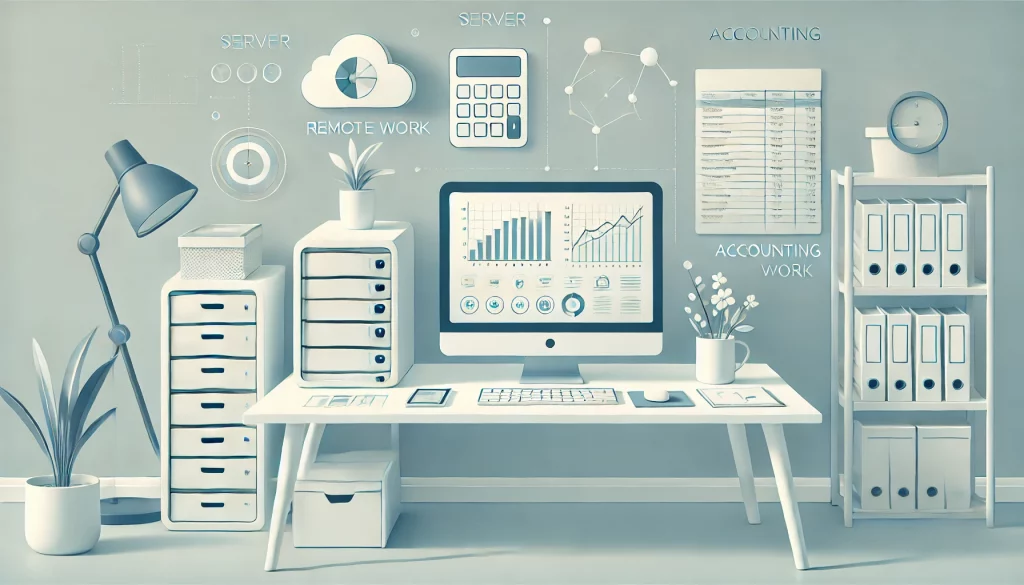
With the advancement of technology, more and more companies are transitioning their accounting operations to remote work. It’s convenient, as you can work from anywhere without being tied to an office. However, to ensure seamless and reliable operation of the accounting system, an appropriate server is required. So, how do you choose a server for remote accounting work in such cases? In this article, we will consider key criteria and practical advice.
What is an accounting server?
An accounting server is a powerful computer where all the company’s data, accounting software, and files are stored. Remote users connect to it to perform bookkeeping, generate reports, and carry out other operations. The server must ensure data security, fast access, and stable software performance.
Key criteria for choosing a server
When selecting a server for remote accounting work, it’s essential to consider the following characteristics:
1. Processor. The speed at which the server processes user requests depends on the processor’s power. For small companies where 2-5 people work simultaneously, a server with 2-4 cores is sufficient. However, for larger teams or complex accounting systems, a more powerful processor is needed — with 4 cores or more.
2. RAM. This parameter determines how many programs and processes the server can handle simultaneously. For accounting work, a server with 4-8 GB of RAM is optimal. If multiple accounting programs or many users will be working on the server, it’s better to choose a server with 16 GB or more.
3. Disk space. When choosing a server, it’s important to pay attention to disk capacity. If your company uses many large files (documents, reports, etc.), it’s better to opt for a server with ample disk space — from 100 GB. It’s also important to consider the type of disk. SSD drives provide faster data access, making them a better option for ensuring the quick operation of the accounting system.
4. Data protection. The server must be securely protected, as accounting data is confidential. Choose a server that supports data encryption and regular backups. This will help avoid data loss in case of a failure or unauthorized access.
5. Bandwidth. For stable remote work, the server must ensure high bandwidth. This will prevent delays in processing user requests, which is especially important during peak loads (e.g., during report submission periods).
Practical advice from RX-NAME
Apart from the main criteria for choosing a server, it’s important to understand other significant characteristics. That’s why we’ve prepared several practical tips for you:
1. Needs assessment. Before choosing a server, analyze how many users will be working simultaneously and which specific accounting programs will be used. This will help you select a server with optimal characteristics.
2. Scalability flexibility. Choose a provider that offers flexible plans with the ability to increase resources in the future. For example, RX-NAME offers various plans with different levels of processor power, RAM, and disk space. This will allow you to easily scale the server as business needs grow.
3. Reliable support. It’s crucial that the server provider offers 24/7 technical support. If any issues arise with the server, specialists should always be available to quickly resolve unforeseen situations.
4. Regular backups. Set up automatic backups on the server to ensure that, in case of technical issues, you always have access to the latest version of your data. Providers like RX-NAME offer regular backup setup options, significantly enhancing data security.
5. Testing and configuration. Before fully launching, the server needs to be configured and tested. This helps avoid potential malfunctions or incompatibilities between accounting software and the server. Make sure all systems operate smoothly and meet your requirements. RX-NAME offers the possibility to test a VPS before full implementation.
6. Minimizing downtime. To avoid downtime in accounting operations, it’s important to choose a server with a high level of reliability. Pay attention to uptime guarantees — the indicator of uninterrupted operation time. Most quality providers offer uptime no lower than 99.9%. This means the server will be available almost all the time without major interruptions.
As we can see, choosing a server for remote accounting work is a responsible step that impacts the efficiency of the entire team. It’s important to accurately assess business needs, consider processor power, RAM, and disk space, as well as data security levels. RX-NAME offers flexible solutions that allow you to choose the optimal server for comfortable and reliable accounting work.
Check out the various plans and details on the VPS page from RX-NAME. By choosing a server at RX-NAME, you get the ability to scale resources according to your business needs and always have the support of professionals.
Learn more about the services and plans on the RX-NAME website.

Leave a Reply